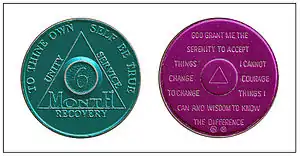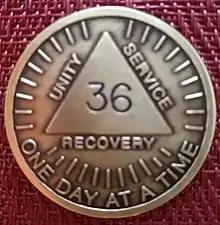Sobriety coin
A sobriety coin is a token given to Alcoholics Anonymous or other 12 step group members representing the amount of time the member has remained sober. It is traditionally a medallion the size of a poker chip 33 mm (Standard) or 34 mm in diameter marking the sobriety time achieved, awarded for abstaining from alcohol while with the program. In other 12 step programs it is to mark time abstaining from whatever the recipient is staying away from. There is no official AA medallion or chip; they are used in AA culture but not officially Conference Approved, and the AA logo has not been granted for use on medallions.[1]

History
Alcoholics Anonymous was not the first organization to use sobriety chips: other temperance societies gave medallions to those who swore to stop drinking/using and to track the duration of their sobriety.[2]
First use
Dr. Bob and the Good Old Timers, the history book for Alcoholics Anonymous, discusses the work of Sister Ignatia in Akron, a nun who was devoted to assist early members of A.A. and was known for passing out coins to these members. In this book, it states, “Sister Ignatia gave each of her newly released patients a Sacred Heart Medallion, which she asked them to return before they took the first drink. She would occasionally give out St. Christopher and St. George medals as well.” [2]
Use in AA
The actual history of how the A.A. chip came about after this is still a mystery. It is believed to have originated in 1942 in Indianapolis. The man who began the Alcoholics Anonymous section in Indianapolis, Doherty S., is thought to have started the sobriety coin tradition within this section of A.A.[3]
The Portland Group (Maine) began a tradition of using colored poker chips to mark time of sobriety.[4]
As each section of A.A. saw fit, it joined in on the sobriety coin custom. As private companies saw these coins being used, they began to manufacture “A.A.” chips (even though they were not affiliated with Alcoholics Anonymous) and sell them to different sections. It is believed that the company that made the modern chip as we know it today occurred in Minneapolis in 1965.[2] Wendells Inc from Ramsey, Minnesota began manufacturing the raised center bronze AA Medallion in 1973. The Wendells medallion is the most common bronze coin given by AA members.[5]
Meaning
When a twelve-step member is presented with his or her first chip, they are often told, "This chip represents AA's commitment to you – not your commitment to us". Sobriety coins themselves do not necessarily help the holder stay sober, but studies have shown a connection between the visual presence of the coin and the holder's self-resolve. The coins are meant to motivate the holder to continue their abstention from the subject of their addiction.
Coin design
.jpg.webp)
“Alcoholics Anonymous is a fellowship of both men and women who share their experience, strength, and hope with each other that they may solve their common problem and help others to recover from alcoholism”.[6] To show how far along each person is in their sobriety most A.A. groups use a chip of a particular color or alloy that constitutes a range of time that person has been sober.[6] These different colored chips and values are meant to be tokens of inspiration and a reminder of just how long the member has been sober and how far that member has come. It is evident that “early on, many people in A.A. carried personal mementos to remind themselves of the importance of their sobriety” .[7] From personal mementos to coins, the practice of giving out something such as a sobriety chip represents the will and desire that a person has to quit drinking. “The practice of giving sobriety chips in A.A. is attributed to a group in Elmira, N.Y. in 1947. The celebration of birthdays came from the Oxford group where they celebrated the anniversary of their spiritual rebirth, in Alcoholics Anonymous people choose the anniversary of the date of their first full day without a drink. There are fourteen basic coins that are given to members within their first year of sobriety. Generally coins are given at one month, three months, six months, nine months of sobriety the first year. After this coins are given after each yearly milestone.

Typical coin milestone colors
- Silver Chip – 24 hours of sobriety
- Red Chip – 30 days/1 month of sobriety
- Gold Chip – 60 days/2 months of sobriety
- Green Chip – 90 days/3 months of sobriety
- Purple Chip – 4 months of sobriety
- Pink Chip – 5 months of sobriety
- Dark Blue Chip – 6 months of sobriety
- Copper Chip – 7 months of sobriety
- Red Chip – 8 months of sobriety
- Purple Chip – 9 months of sobriety
- Gold Chip – 10 months of sobriety
- Green Chip – 11 months of sobriety
- Bronze Chip – 1 year of sobriety.[8]
“The chip system is optional and not a part of all A.A. groups nationally or worldwide”.[9] In 2011, the General Service Office of Alcoholics Anonymous estimated that there were about 58,000 Alcoholic Anonymous groups throughout the United States.[9] All the chips after the One Year-chip are traditionally also bronze. There are special novelty chips that come in other metals, colors, types and designs. Common premium sobriety chips are gold- and silver-plated, colored and sometimes coated in a clear epoxy dome.
Notes
- "The Meaning Behind AA Chips And Medallions".
- "Origin of AA coins, chips, tokens or medallions – AA FAQ". Anonpress.org. Retrieved 2014-04-12.
- "Alcoholics Anonymous : Frequently Asked Questions About A.A.'s History". Aa.org. Retrieved 2014-04-12.
- "Barefoot's World". www.barefootsworld.net.
- "The Story Behind The Wendells Raised Center AA Medallion".
- http://www.aa.org/pdf/products/m-24_aafactfile.pdf
- "AA Medallions | AA Coins | AA Tokens | AA Chips | Recovery Gifts | AA Token". Sobermedallions.com. Retrieved 2014-04-12.
- "How Do I Get an AA Chip?". FindRecovery. findrecovery.com.
- "My Blog – My WordPress Blog". www.seekingthelight.com.
References
- The Anonymous Press. (n.d.) Origin of AA coins, chips, tokens or medallions? Retrieved from anonpress.org
- Alcoholics Anonymous (2012). Frequently asked questions about AA's history. Retrieved from www.aa.org
- Independent Alcoholism Help Council (IAHC). (2012). Relapse prevention and sobriety aids. Retrieved from www.alcoholic.org
- Barefoot's World. (2002). Some history of AA chips. Retrieved from www.barefootsworld.net
- Marijuana Anonymous Online. (2012). MA Online sobriety chips. Retrieved from www.ma-online.org
- General Service Office of Alcoholics Anonymous. (1956/2011). A.A. fact file. Retrieved from www.aa.org/pdf/products/m-24_aafactfile.pdf
- Man, M.E. (2008, July 2). What are the chips that they hand out at the end of an A.A. meeting?
- Christian Recovery Forums. (n.d.). AA glossory. Retrieved from https://web.archive.org/web/20140217221637/http://www.ipass.net/a1idpirat/AAglossary.html
- Meaning Behind Medallions. RecoveryChip
